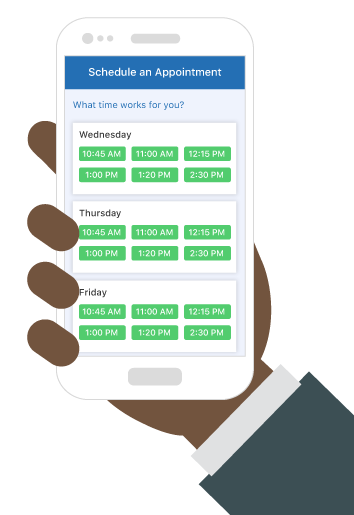Mental Health Barriers and Resources for Black Mississippians

Mental healthcare across the United States is in a state of crisis. With increasing mental illness and fewer available practitioners, patients often face barriers in identifying their illness and accessing treatment. These barriers make it even more difficult for minorities to receive care.
Black Mississippians, especially men, are more likely to experience mental illness than white individuals. At the same time, they are less likely to receive help. In this article, we speak with Jasmine Padgett, MD, an African American internist and pediatrician at Singing River, about mental illness in her practice as well as the cultural and financial obstacles her patients face in receiving mental healthcare.

Jasmine Padgett, MD
To make an appointment with Dr. Padgett, contact the appropriate clinic:
Cultural Stigma
For Black men, accessing mental healthcare is often hindered by cultural stigma that is rooted in systemic racism, discrimination, and a lack of access to quality healthcare. As a result, many Black men may feel ashamed or embarrassed to seek help for their mental health issues, fearing judgment or being perceived as weak.
This stigma can also lead to feelings of mistrust towards mental health professionals, as seeking help is often seen as a sign of personal failure or inadequacy.
The Effects of Cultural Stigma
According to the National Alliance on Mental Illness (NAMI), only one-quarter of African Americans seek mental health care, compared to 40% of white individuals, highlighting the significant impact of this stigma.
While a high percentage of Dr. Padgett’s overall patients report feelings of anxiety and depression, this does not include her Black male patients.
“Based on what I see, I rarely see Black men with depression on their chart.
Not many men not come into their appointment saying that they’ve been feeling depressed and need help. One reason could be that they’re simply unaware that they could reach out for help. Unless you specifically ask about depression, most men do not bring it up unprompted.”
Destigmatizing Mental Healthcare
Dr. Padgett works to destigmatize treatment for mental health during discussions with her patients in which she assures them that they are not alone:
“A lot of the men that I have had in my clinic who do talk about depression are usually looking straight ahead at the wall instead of towards me. You can tell it’s an uncomfortable conversation for them.
I try to destigmatize it by saying that I’ve noticed a lot of people have been down lately. I’ll ask them what they think about medications and things like that. You’re more likely to reach more people if you at least initiate the conversation.”
Below, we break down some of the most common barriers for mental healthcare among Black men, but these barriers can apply to nearly anyone.
Representation
As a community health system, our patients should see themselves reflected in the professionals providing their care. Singing River’s diverse staff provides care without judgment to ensure that our patients’ mental wellbeing is prioritized and respected.
When asked about ways to improve mental healthcare for Black patients, Dr. Padgett offered these thoughts on provider representation:
“One of the things that makes mental healthcare interesting and unique is that you really have to be able to relate and connect to your provider. Representation does matter. When your healthcare provider looks like you and talks about mental health, it helps destigmatize it. Being able to relate to somebody culturally matters, too.
When you’re talking about personal things, like feeling down or that life feels particularly harder for you because you’re Black, it’s really important to be able to feel you can talk to your provider about that.
It’s more relatable if I can say to a patient things like, I’ve been where you’ve been, I’m from the area you’re from, I know what the struggle of living in a difficult neighborhood is like, etc. That’s not just for African Americans—you could say that for any ethnicity. People relate more to people who have the same cultural experiences.”
Financial Barriers
Navigating the complex landscape of mental healthcare often comes with unexpected hurdles, many of them financial. These costs include the price of appointments, medications, transportation, and time taken off of work to seek treatment.
The wealth gap between Black and white Mississippians means that Black residents have lower income, higher rates of poverty, and less medical insurance. Racial minorities in Mississippi have some of the highest rates of being uninsured in the nation. Nearly 42,000 (13.7% of all uninsured) of these are Black residents.
For countless people, accessing the treatment they need to manage their symptoms becomes a daunting financial challenge that exacerbates an already stressful situation.
Cost of Appointments
Talk therapy counseling, also known as psychotherapy, may have a high hourly price tag, but therapists will often offer low-cost or “sliding scale” prices that are based on a patient’s income. Search for “sliding scale therapy” when looking for a therapist to find one nearby.
Singing River Outpatient Behavioral Health
Our Outpatient Behavioral Health Services Clinic provides psychiatric evaluation and treatment, medication management, individual therapy, family therapy, and group therapy. If you do not have insurance, we offer a cash pay option. Contact the office to receive an estimate for the services you need.
Call (228) 696-9224Cost of Medication
While medication can provide relief from the debilitating effects of mental illness, the financial burden they impose can be overwhelming. Dr. Padgett confirmed that patients may decline treatment for mental illness when faced with the additional cost:
“Financial strain is a big factor. I’ll prescribe medication, and one of the things I’ll hear is that it costs too much.
Sometimes people won’t take medicine because they can’t afford it. And instead of telling their provider that they cannot afford it, they just don’t take it.
I think that people who suffer from anxiety and depression want to take medicine for their anxiety and depression. Most people who are depressed—if they have the means—take something to get better.”
Pharmacy Assistance
The pharmacies at Pascagoula Hospital, Ocean Springs Hospital, and Singing River Gulfport have options to help make prescriptions more affordable. In addition to the below discounts, they are happy to look at any vouchers or coupons to make sure that our patients are getting the best deal on their prescriptions. Free mail-to-home services for prescriptions in Mississippi (some exclusions apply).

- Drug Savings Card on medications not covered by insurance
- Discounts on non-covered drugs
- Manufacturer discount cards
- Singing River Employee OTC Discount program
Cost of Multiple Medical Issues
African American Mississippians often have more than one medical issue to treat. The presence of two or more chronic conditions in a person at once, also known as comorbidity, can quickly compound the price of a person’s healthcare.
“African Americans suffer from other medical conditions at a higher rate than other ethnicities. Take heart failure, for example. They’re probably on medication like ENTRESTO, or if they can’t afford that, a combination of two pills instead of one, a statin medicine, a beta blocker like Metoprolol, and vitamin D.
It takes a lot of medicines to manage just that one disease. So, if a person can only afford to purchase 9 out of ten of their medications, their mental health medication becomes a bigger financial obstacle.”
Cost of Transportation
Without reliable transportation, traveling to any kind of appointment is a barrier between a patient and their healthcare.
18 percent of Black households do not have access to a vehicle, which leaves thousands of people to rely on other methods. Asking a friend or loved one for a ride can be inconvenient, and using a rideshare service can be expensive, but there are other options available that may help reduce the stress of accessing mental healthcare:
Option 1: Telehealth Virtual Visits

Patients can visit with a local primary care provider through their smartphone, tablet, or computer for basic mental health issues including feeling anxious or depressed.
If a higher level of care is needed, the provider can refer the patient to a specialist. For patients without health insurance, a telehealth appointment is only $60 per visit.
Option 2: Free or Low-Cost Transportation
Jackson County
Good news for patients who live in Jackson County! Between the hours of 7AM-4PM, Monday-Friday, Singing River Patient Transportation provides free, door-to-door transportation to medical appointments.

Transportation includes going to see ANY mental health professional in Jackson County (based on availability), regardless of whether they are part of Singing River.
Harrison County
The Coast Transit Authority (CTA) has a similar, free healthcare transportation program in Harrison County. However, it is only available for senior citizens. It runs from 9AM-2PM Monday through Friday. To set up transportation through this service, patients need to get certified at Harrison County Senior Services by calling (228) 896-0214.
CTA also has bus routes in Gulfport, Biloxi, D’Iberville, and Ocean Springs with a $1.75 cash fare. See routes and schedules.
How to Get Started With Mental Healthcare
Dr. Padgett notes that “mental illness impacts just about every aspect of your life—from your job to your family to how you handle and manage stressors.” Therefore, seeking mental healthcare is a demonstration of strength.
It takes courage to confront one’s mental health struggles, especially in the face of stigma. By seeking help, you not only prioritize your wellbeing but encourage others to prioritize their mental health as well.
Visit a Primary Care Provider
If you feel nervous about getting help or don’t know how, a great place to start is by visiting a Primary Care Provider.
At a scheduled Singing River regular wellness exam, you will receive a Patient Health Questionnaire that can help your provider assess whether you have anxiety or depression symptoms and see how you are responding to any related treatment.
Your Primary Care Provider can treat mild forms of mental illness, and they can also refer you to a specialist if you need a higher level of care.
Schedule an Appointment
You can schedule your first visit with a Primary Care Provider online or by phone:
- Call the Singing River Medical Clinic of your choice
- Visit MySingingRiver
- Use our Appointment Scheduling Widget
Mental Health Resources
Visit the Mental Health Resource Guide for more information on mental health resources in our community.
Disclaimer:
This article is not intended to provide urgent mental health assistance. If you or someone you know is in immediate danger or experiencing thoughts of suicide, please call 988 or your local emergency services for immediate help. This post is meant to provide information and resources for general mental health awareness and should not be used as a substitute for professional advice or treatment.

